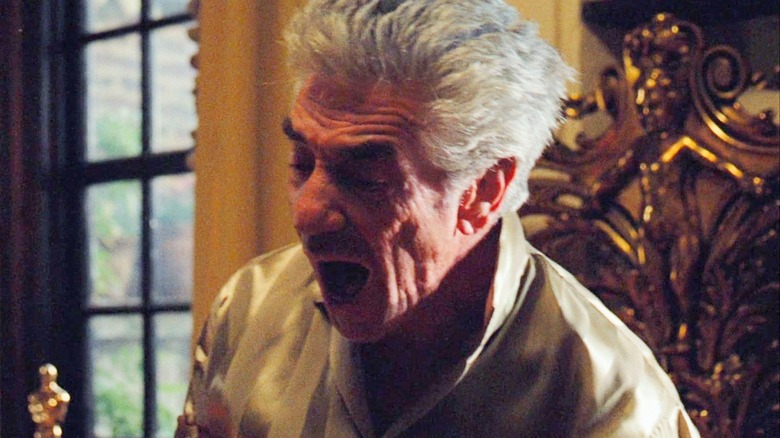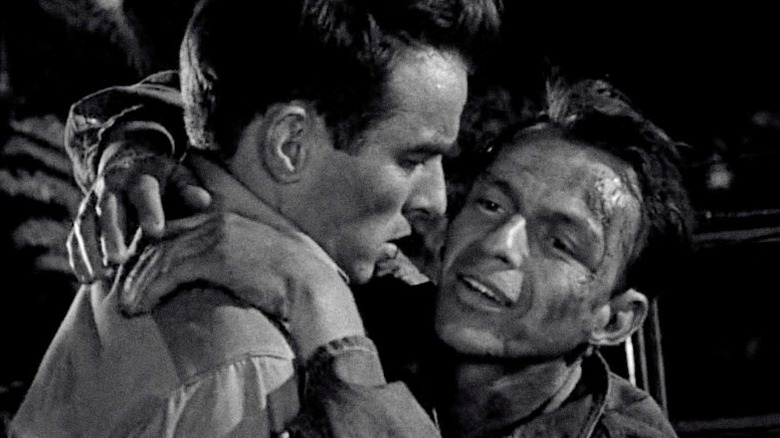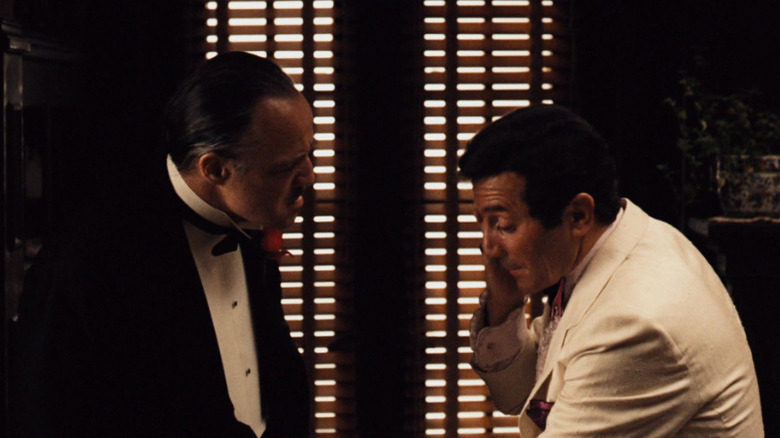How A From Here To Eternity Rumor Inspired The Godfather's Most Shocking Scene
It's hard to believe it's been 70 years since Fred Zinneman's "From Here to Eternity" came out. Not that we were all there of course, but time has been really kind to the all-star, Best Picture-winning drama. Unlike many of the rah-rah war films emerging from America during and post-World War II, "From Here to Eternity" argues not that war is hell — since most of the movie takes place during peace time — but that men, even in the army, are subconsciously determined to make life hell whether there's a war on or not.
Montgomery Clift, Burt Lancaster, and Frank Sinatra star as soldiers stationed in Hawaii immediately prior to World War II, whose stubborn pride and barely contained insecurities lead directly to many avoidable tragedies. Clift plays Private Prewitt, a formerly promising boxer who refuses to box again after accidentally blinding a fellow soldier, and endures criminal abuse just because his captain wants a champion boxer in his regiment. Burt Lancaster plays First Sergeant Warden, who is having an affair with his commanding officer's wife, Karen (Deborah Kerr), but constantly self-sabotages his career, ruining his chances of running away with her.
Then of course there's Frank Sinatra, who won a Best Supporting Actor Oscar for his performance as Private Maggio, a friendly gambler and ne'er-do-well who starts a feud with the wrong man, Fats (Ernest Borgnine), who runs the stockade — a place where Maggio seems destined to eventually go. It was a role that helped transform Frank Sinatra's image from a crooner who sometimes acts to a respectable dramatic actor in his own right, and one of the biggest celebrities in the world.
And according to Hollywood legend, Frank Sinatra might have got the part by calling in a favor from the mob, inspiring the notorious and horrifying "horse head" scene from "The Godfather."
Once upon a time in New Jersey...
Before he became (arguably) the most famous singer of the 20th century, Frank Sinatra was raised in New Jersey, where he had direct family connections to organized crime. His godfather (not the metaphoric movie kind, his actual godfather) was Guarino "Willie" Moretti, an underboss for the Genovese crime family who used his criminal influence to help a young Sinatra book singing gigs. He also allegedly used force to help extricate Sinatra from an early, unfavorable contract with famed band leader Tommy Dorsey when the crooner started getting big.
The FBI even had a file on Sinatra, who allegedly bragged about knowing infamous criminals like Bugsy Siegel. So it's perhaps understandable that, when the story circulated that Frank Sinatra used his mafia connections to nab a serious dramatic role, in an adaptation of an acclaimed, award-winning, best-selling novel, people were willing to believe it. After all, this was a singer whose previous films were mostly song-and-dance comedies. Some of them were pretty danged good — "On the Town" is a classic, and his buddy musical with Gene Kelly, "Anchors Aweigh" was nominated for Best Picture — but casting him in such a plum part probably raised eyebrows.
Then again, those eyebrows may have lowered when people saw the film and realized 'holy cow, Sinatra can really act,' or at least after he won the Academy Award for Best Supporting Actor. Especially since he beat out some hefty competition, including Eddie Albert in "Roman Holiday," Robert Strauss in "Stalag 17," and Jack Palance and Brandon deWilde, both from "Shane."
An offer he can't refuse
Did Frank Sinatra use his mob ties to get his role in "From Here to Eternity?" Maybe. He may also have used different connections: his then-wife, superstar Ava Gardner, allegedly helped by convincing studio head Harry Cohn's wife to manipulate the mogul's casting decisions. (Sinatra also reportedly begged.)
Either way the rumor persisted, and when Mario Puzo wrote "The Godfather," there was a character named Jonny Fontane who Sinatra was not happy with. (He allegedly told Puzo, "I ought to break your legs.") As played in the film by singer Al Martino, the fictional entertainer is the godson of mob boss Vito Corleone (Marlon Brando), who used force to help extricate him from an early, unfavorable contract with a famed band leader. (When Michael Corleone, played by Al Pacino, finishes telling that anecdote he adds: "That's a true story.")
Fontane sings at Corleone's daughter's wedding, and tells the mobster he needs a role in an upcoming film based on a bestselling novel to revitalize his career, and that studio head Jack Woltz (John Marley) refuses to cast him. Corleone says "I'll make him an offer he can't refuse," but when he sends his consigliere, Tom Hagen (Robert Duvall), Woltz isn't impressed. It's only when Woltz wakes up in the morning with his beloved horse's severed head in his bedsheets that Fontane gets the part (which probably won him an Oscar).
For what it's worth, there's no indication — not even a rumor — that a horse lost its head in order to get Sinatra the "From Here to Eternity" role. According to director Fred Zinneman, that detail was "pure invention" and "poetic license" on Puzo's part.
Weirdly enough, Al Martino claims he used similar tactics to appear in "The Godfather." When Francis Ford Coppola gave the role of Jonny Fontane to singer Vic Damone, after Martino had already been cast by producer Al Ruddy, Martino says his mafia friends planted news stories that claimed Coppola was "unaware" of Martino's deal. And with that, Damone (probably wisely) backed out.
Sometimes life imitates art. Sometimes art imitates life. Either way... nobody messes with the mob.


